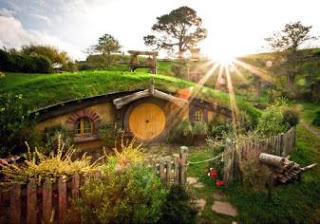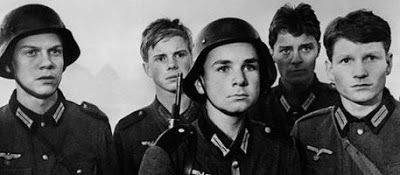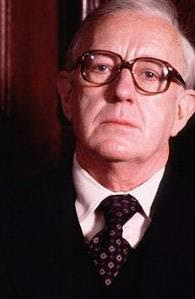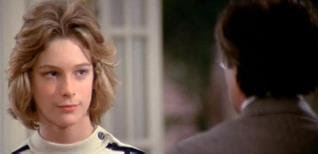upon good quality in order for me to thoroughly enjoy them, rather than merely
tolerate them. To me, good quality means intelligent thoughtfulness and
experienced creativity in all aspects of film-making. Among other criteria, the movie should have a
theme that is worth watching and considering.
That usually means adult topics.
I will clarify what I mean with a few just a few movie examples.
that are based upon comic books and their almost endless sequels, impossible
action-adventures with superheroes and villains. Apparently, the scripts are written by
Southern-California twenty-year-olds with little formal education and virtually
no cultural upbringing. They are not
interested in making good quality movies; they just want to make lots of money,
catering to easily satisfied audiences.
such “100% good guys versus 100% bad guys” themes indoctrinate Americans, e.g.,
adolescent boys with limited rational capabilities, into believing that all
challenges in life are threatening and physical, as opposed to cerebral and
spiritual, and that we must attack and kill the enemy to solve all of our
problems. The degree of gratuitous
violence in so many movies worries me.
It stands to reason that this general behavior now is reflected throughout
our society, ranging from pervasive lack of civility, pervasive crime, mass-shootings,
unwarranted wars, and bad votes.
distasteful. So many young American
actors regularly are supplied lines that are supposed to sound clever and cool,
reflecting affected self-assuredness, hubris, and arrogance. Also, their facial expressions and
body-language are so affected, portraying arrogance or even physical threat to
others. I cringe each time I hear and
see such behavior. I prefer natural,
unaffected portrayals.
there have been many movies and television series that I have admired and,
consequently, often have watched more than once. Some are from independent film-makers. A good number of these have been British or
other foreign film-companies, writers, directors, and actors, who demonstrate a
high degree of maturity and professionalism.
1979 BBC series “Tinker, Tailor, Soldier, Spy” is one of the all-around
best-quality productions I ever have seen.
To begin with, the superb writer of the book, David Cornwell (pen-name
“John le Carré”), has worked for both British MI5 and MI6, most likely has
continued his contacts, and obviously knows what he was talking about. Secondly, this well-informed, highly
intelligent man writes honestly, reflecting the good, bad, and often mediocre
behavior and character of governments and human beings. Then, the screenplay-writer also was
excellent, as well as the director and all of the crew. For the leading role, they chose the
consummate actor Sir Alec Guinness as George Smiley.
had his choice of the very best actors in all of Britain. In addition to their great experience and
professionalism, their appearances, voices, and mannerisms fit the roles like a
glove. Unfortunately, a discerning
viewer must obtain the uncut, British Region-2 DVDs for the best experience and
clearest plot-development, for some crucial scenes were cut for U.S. audiences in
order to force the episodes into one-hour time-slots; and the idiots used those
shortened episodes for the American DVDs.
Also, don’t bother to watch the more recent movie-version. I gave it a C- rating in my review on Amazon.
 For theater-movies, I admire
For theater-movies, I admiremany aspects of New Zealand director Peter Jackson’s “Lord of the Rings.” For the thousands of people involved over
several years in this major project, this effort was a labor of love. So much care went into making these films that,
for example, the set for Hobbiton was constructed and planted way in advance of
filming so that the flora would have a chance to develop. Professional sword-smiths were hired to
create masterpieces for the major characters.
Fine-tuning the script continued to the very last minute, requiring the
London Symphony Orchestra to also
fine-tune their sound-track recordings.
Even after Jackson won the Oscar with
the final episode, “Return of the King,” he had his crews continue filming to
make improvements for the DVD sets to come.
I know of no other film-project that has done this.
 American independent
American independentfilm-makers and foreign film-makers have made many films over the years that
explore human nature and realistic situations, such as docudramas like the
acclaimed, German film “The Bridge.”
Based upon a true, 1945 event in the last days of the war, schoolboys
were forced into uniforms and ordered to guard a small bridge in their own
village, the very route American tanks were approaching. One boy was severely wounded. All the others perished. The western allies required Germans to view
the film to further emphasize the terrible consequences of their too easily
having let themselves be led in to a catastrophic war. “The Bridge” is considered to be one of the
two best anti-war films made.
“Remains of the Day” that explored the unnecessary self-denial and repressed
emotions of an all-too-traditional butler.
I realize, as much as I appreciate these films, that many people who are
used to hyperkinetic, childish adventure-films, don’t care for mature, cerebral
films because these are regarded as “too slow, too boring.” As a matter of fact, just such a person gave
me his copy of the “Remains” DVD because he was disappointed that it didn’t
have more action and wartime violence.
films is Italian director Luchino Visconti’s prize-winning “Death in Venice”
based upon, what many literary critics declare to be, “the best novella of the
twentieth century” and written by “the best novelist of the twentieth century”
Thomas Mann. The Cannes Film Festival
awards once held a retrospective contest covering films from a quarter of a
century. “Venice” won the grand prize
and was declared “a masterpiece.” The
cinematography alone is a masterpiece with many scenes resembling tableau-artwork. The lead actor Dirk Bogarde deserved “best-actor”
awards from all such contests.
Most of the sublime accompanying music is by the great composer Gustav
Mahler.
of the European Baroque era, I like the unique, Golden-Globe-winning film
“Farinelli,” loosely based upon the reputation of the acknowledged greatest
singer in history, Carlo Broschi, stage-name “Farinelli.”
is, anyone who has bothered to learn history knows that the screenplay
accurately reflects only about 10% of the real person, 20% based upon the
reputation of other contemporary singers, 20% based upon the Baroque culture
and opera of the time, and 50% simply made up to entertain the audience. Even so, I enjoy the film. There is no other like it. I recommend the music CD.
are worthy of winning Cannes’ Palme d’Or, perhaps the most prestigious
film award. Even my most sober friends
and I have enjoyed the “Harry Potter” movies.
In addition to their being very imaginative, they seem to succeed as an
antidote to the banality of the real world, even despite the scripts’ frequent
egregious errors in diction, grammar, and style. And, I have to admit also that I often have
watched some good quality films and DVDs simply because I am inclined to
identify with attractive characters whose attributes and lives appear more
interesting and satisfying than, too often, my own life. I’m not sure that the practice of watching
such films is of any practical purpose, but they are a captivating distraction. Still, some are included in my DVD
collection.
would like to produce to perfection several films based upon topics dear to my
heart. Of course, that is a real
fantasy.
people and their life stories. I also
realize that, although my own life has not brought me particular fame or
fortune, I too have had some noteworthy experiences and, at times, unusual
ones. Since I joined this Story Time
group, I have derived pleasure and satisfaction participating in the group. I do put some thought and effort into my
stories, and I hope that you find them interesting.




